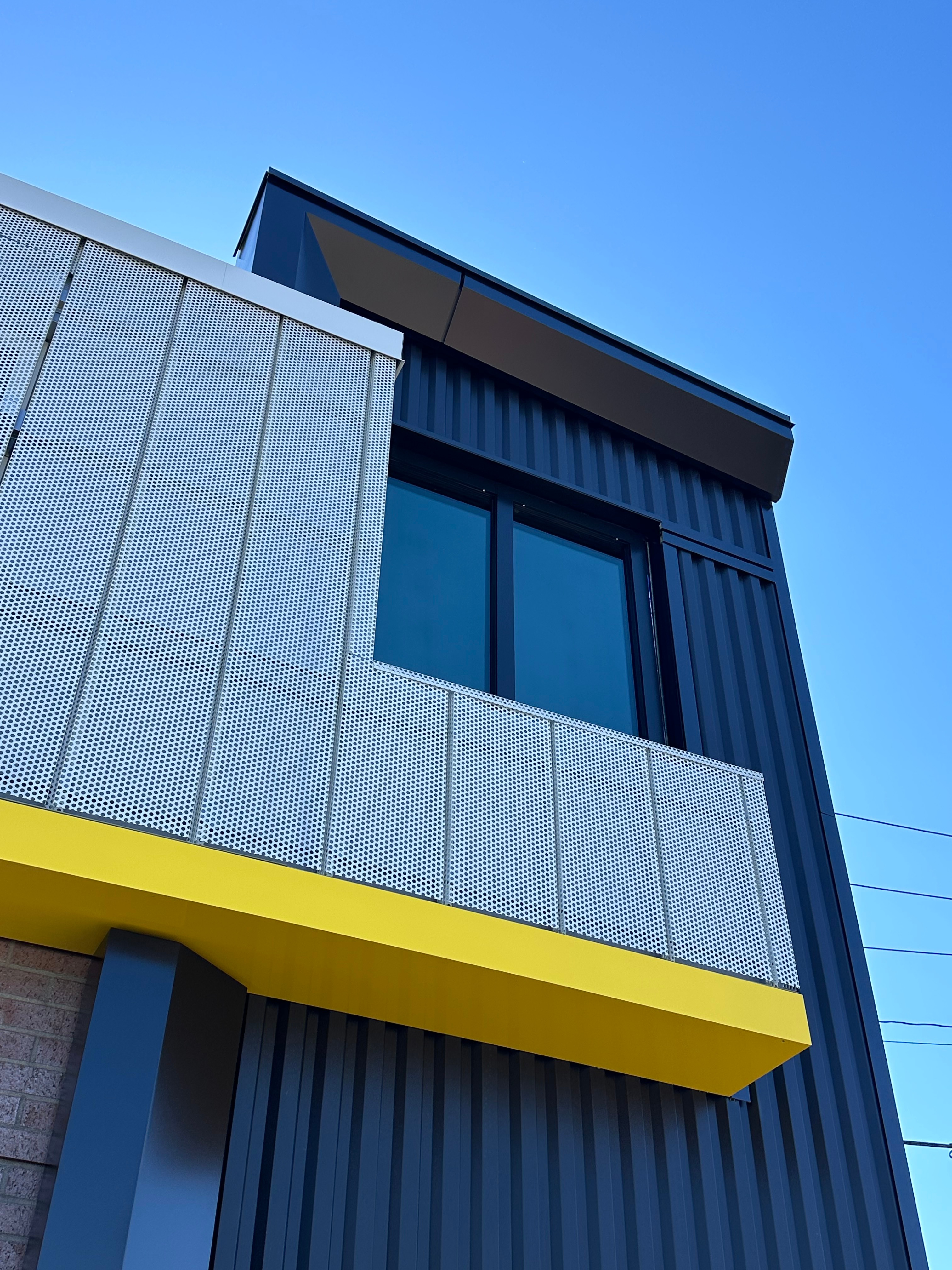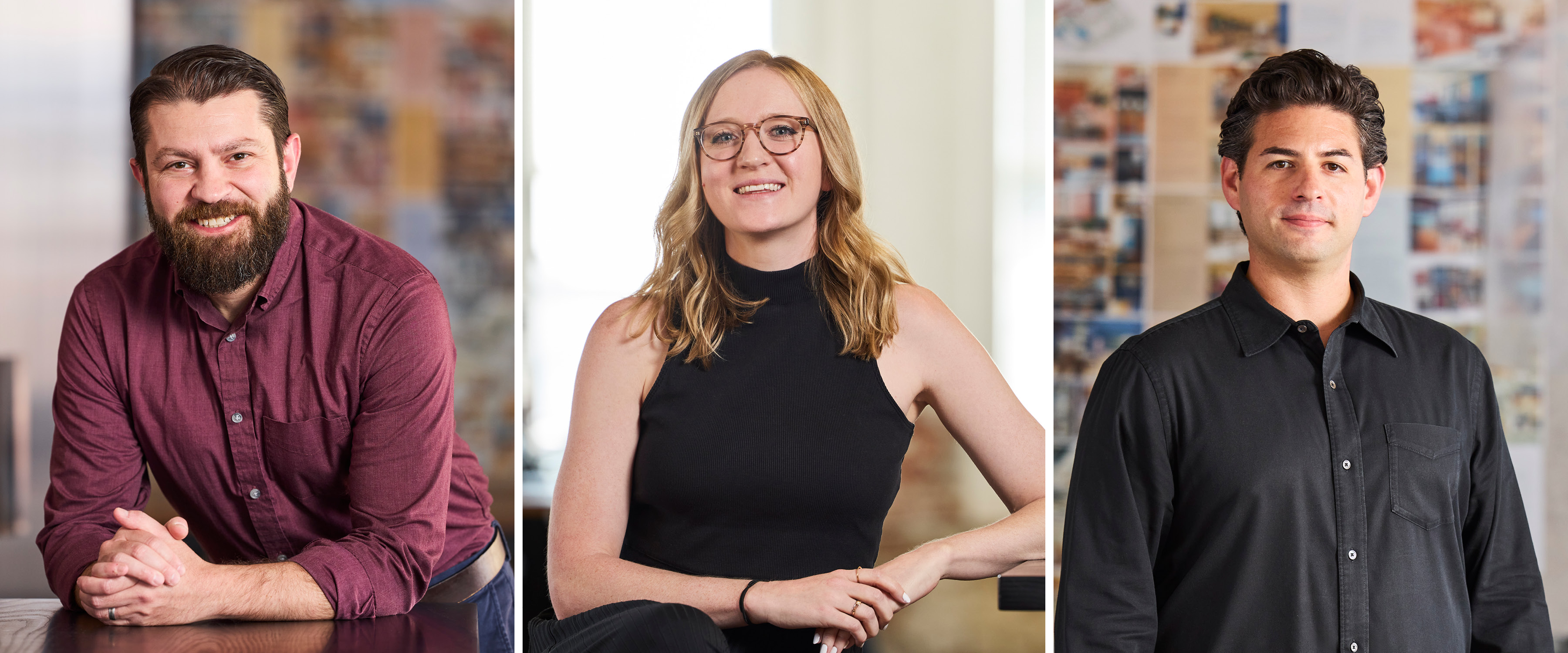PERSPECTIVES
RODE appeared in a Boston 25 News segment by Kelly Sullivan, with Principal and founder, Kevin Deabler discussing energy efficiency in homes alongside Mara Tu from the Allston Brighton Community Development Corporation.
The segment aired on television in the morning, with the full story and video also available online. It focuses our increasing energy demands due to AI, and how energy efficiency in buildings can help offset this, highlighting RODE's work in passive homes and larger passive house developments. In addition to energy saving measures, the segment discusses how more efficient buildings can also help residents save on energy bills.
This month, RODE Architects and Lee Kennedy Co. completed the construction of the project’s visual mockup. We recently visited the site with design leaders from the city’s planning department, and received acclaim for our attention to detailing and craft. This moment marks a key milestone for the success of the project.
Building mock-ups can be perceived to be a costly exercise, but we know that their value outweighs the upfront costs. Through the mock-up process we are able to gain crucial knowledge of how the drawings are being interpreted. It gives us the opportunity to work with the subcontractors ahead of the install, while also listening to their expertise. Furthermore, we are able to evaluate the details of different trades and materials, ensuring they work in dialog. This allows us to make crucial adjustments, finalize color selections, and confirm that the assembly is entirely aligned with our design intent.
Beyond the constructability and collaboration with the builders we are able to better understand the atmospheric qualities of the composition. The balance of material and light. This is where the project starts to come to life. Architects and designers are able to digitally represent these atmospheric effects through renderings, but even the computer can’t capture the true beauty. We will revisit the mock-up over the next few months to better understand the effects of the sun, the rain, the clouds, and light refractions. The color of the sun is different in the mornings, vs the glow of the sunset. How does the mock-up react to the snow? We can’t wait to find out! These are times that we receive unexpected joy. It is through these moments where the entire team recommits itself to the goals of the project – to make a hospitable place for our kids and their families to thrive.
We're thrilled to welcome Leena Kent to the RODE Architects team as our new Senior Marketing Manager! Leena has over a decade of experience in the AEC industry, along with an extensive background in graphic design and photography. She immersed herself into the industry through SMPS Boston, as a committee member, before leading as the Program Chair and ultimately the Director of Programs. She’s worked with local and national general contractors as well as consultants.
Her unique blend of creative and strategic expertise will be invaluable as we continue to elevate our brand and communicate the RODE story. We're excited to see the innovative ideas and fresh perspective Leena will bring to our marketing efforts.
Outside of work, she enjoys spending time with her husband, twin girls, and goldendoodle while exploring the great outdoors.
We are proud to announce the promotion of three team members as the firm continues to invest in its leadership and talent development. Jonathan Quinn has been elevated to Senior Associate, while Anna Arnot and Zack Kutchin have been named as Associates.
Quinn is being recognized for his leadership in firm operations, as well as his dedication to delivering high-quality work across a wide range of project types, including multi-family renovations, lab campus amenities, and industrial logistics facilities. Arnot and Kutchin have demonstrated strength in their project work, the ability to cultivate strong client relationships, and leadership within the studio.
“At RODE, we believe in creating pathways for our team members to grow and advance through mentorship and a shared commitment to design excellence,” said Kevin Deabler, principal and co-founder of RODE. “Jonathan, Anna, and Zack exemplify that approach, and their promotions reflect both their impact and the value we place on developing the next generation of firm leadership.”
Jonathan Quinn is a LEED Accredited Professional and Registered Architect in Massachusetts with over 20 years of experience across a wide range of project types, including athletic and industrial facilities. He is involved in all phases of design and construction, with a focus on translating client goals into thoughtful, effective solutions. Jonathan holds a Master of Architecture from Roger Williams University. He has worked on projects at RODE such as Chelsea Point and Freight Farms.
Anna Arnot joined RODE as an Architect in 2018. Before relocating to Boston, she spent a decade living, working, and studying in Washington, D.C., where she earned both a Master of Architecture and a Master of Sustainable Design from Catholic University. Anna is passionate about guiding clients through the early stages of design, with a particular focus on aligning programmatic needs with strong conceptual approaches and passive design strategies. Her project experience at RODE includes Fieldhouse+, Vesper Hotel, and Kendall Square Dining Hall.
Zack Kutchin brings experience across multi-family housing, adaptive reuse, industrial, and hospitality. At RODE for eight years, he leads projects from concept to construction, balancing design, function, and sustainability. Known for creative, precise solutions, his work with RODE includes 282 Bremen, Lebanon Woolen Mills, and projects with New England Development. He holds a Master of Architecture from the University of Arizona.
“We’re proud to recognize these three team members for the impact they’ve made on RODE,” said Eric Robinson, principal and co-founder of RODE. “Their growth reflects the direction of the firm and the strength of our next generation of leaders. We’re excited to see them expand their roles, bring fresh perspective, and help shape RODE’s future.”
A long term collaboration between the Boys and Girls Club of Dorchester, the Martin Richard Foundation and the City of Boston, The Fieldhouse+ groundbreaking celebrated an exciting milestone in the project's path to completion!
The ceremony was attended by over 200 people, with state and city officials joining Bill Richard, the co-founder of the Martin Richard Foundation and Bob Scannell, the president and CEO of the Boys and Girls Club of Dorchester (BGCD). The Fieldhouse+, set to be completed in 2026, will provide the children of Boston with not only an indoor turf field for year-round intramural sports, but also a whole host of learning and gathering spaces. The 75,000+ square feet of community-oriented space will serve the 50,000+ young people who live within three miles of its Columbia Point location with facilities and amenities not limited to indoor courts, a turf field, walking track, teaching kitchen, roof garden, theatre, fitness center, conference rooms and more.
A project seven years in the making, The Fieldhouse's design centers on the concept of intersectionality and aims to create a beacon for the community. A lighted core serves as the grounding point for the two large volumes that make up the building, uniting the athletic and educational facilities. Simple, but durable industrial materials work together in creating a welcoming, accessible environment for young people to learn, grow and create community with each other for years to come.
Beyond providing a welcoming and inclusive environment for all, the Fieldhouse+ design paid close attention to its impacts on the environment, designing around enhanced sustainability and resiliency measures. The all-electric project meets LEED Gold standards and aims to be a Net Zero Carbon facility. The Fieldhouse not only will ensure climate resiliency and a safe place for the community during extreme weather events, but also serve as a learning tool for visitors to see these design elements in action.
Learn more about RODE's approach to designing the BGCD Fieldhouse+ here!




